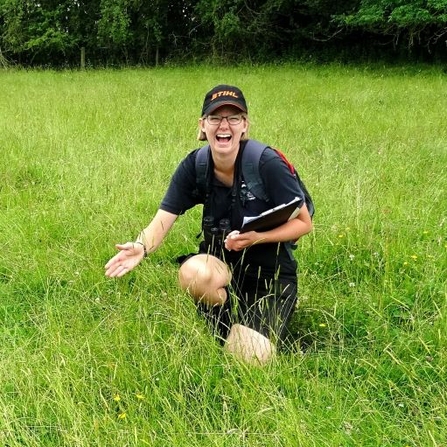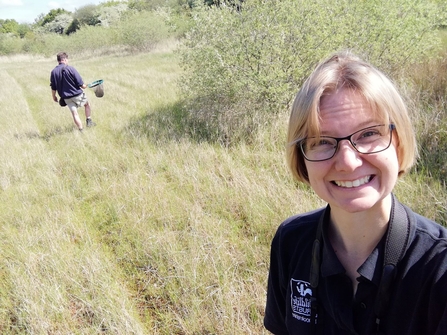
Careers in conservation - Reserves

Coming from a very different background to conservation volunteering was the best way to build up my skill set to an employable level.
What is your role?
I'm the Assistant Reserves Warden at Whisby Nature Park.
Did you have a career before conservation, if so what made you decide to change careers?
In 2019 I was a musician and music teacher, I have a Master’s degree in Orchestral Performance on the clarinet from the Royal Welsh College of Music & Drama and service in one of the best military bands in the world. Believe it or not the music industry is even more competitive than conservation with many people after a few jobs that come up infrequently. I had been working predominantly as a teacher for 7 years with the occasional gig on the side and not feeling I was making much of a difference. I felt I was catering to the elite and I didn’t like it; music lessons and instruments are expensive and apart from the odd school scheme you teach those who can afford it. I’ve always had a passion for conservation and wanted to do something that was lasting and would make a difference in the world so took the plunge in January 2020 to try my hand at something different.

Getting your first role is hard, getting your first permanent role is harder, you’ve just got to keep chipping away. Often the job description and person specification ask for lots of qualifications or experience, if it’s something you’re passionate about then apply, even if you don’t hit all the boxes, people can be trained in machinery but enthusiasm and mindset might win the day.
What advice would you give to others who may be currently thinking about making a career change to the conservation industry?
There are many routes into conservation, I haven’t met any two people who have got their role in the same way, but the best thing you can do is volunteer, the more experience you have the more employable you become. Coming from a very different background to conservation volunteering was the best way to build up my skill set to an employable level, picking up practical qualifications for machinery such as chainsaws and brushcutters as I went along.
Cost is a big barrier to people who want to change career, especially those with dependants. I was lucky that I was able to volunteer full-time because I had savings and could move back in with my parents. But you don’t need to do it full time like I did, you can space it out, start small with a weekend conservation organisation, maybe some working holidays. Often full-time volunteer roles or traineeships come with additional perks, like accommodation or the opportunity to work in the shop, café or visitor centre on the reserve so don’t rule them out too fast.
Getting your first role is hard, getting your first permanent role is harder, you’ve just got to keep chipping away. Often the job description and person specification ask for lots of qualifications or experience, if it’s something you’re passionate about then apply, even if you don’t hit all the boxes, people can be trained in machinery but enthusiasm and mindset might win the day.
Cultivate an interest in natural history and pick a specialism if you can. There are times when you will be asked to identify species and not just at an interview (beware the ID sheets!), in a woodland when your task is to thin the birch trees, it helps if you know what they look like! Having an area of interest might make you more valuable to an organisation, and give you something to talk about at an interview.
Volunteering with lots of different organisations is a good thing, there is more than one way to skin a cat and there are many more ways to manage habitats. By seeing many different approaches, you can decide which is the right one for you, not to mention getting your face known and maybe getting to hear about potential job opportunities.
What is it about your job that you enjoy the most?
Working in the outdoors provides a great variety of tasks and no two days are ever the same. Last week I was helping shear sheep, yesterday I was monitoring a colony of rare plants, today we’re fixing steps, tomorrow I’ll be helping out with a Long-Term Monitoring Network project, next week we’ll be starting the hay cut, and it’s all in the outdoors come rain or shine. My office is a nature reserve and it doesn’t get better than that.

Emily at Whisby Nature Park recording the Dawn Chorus

